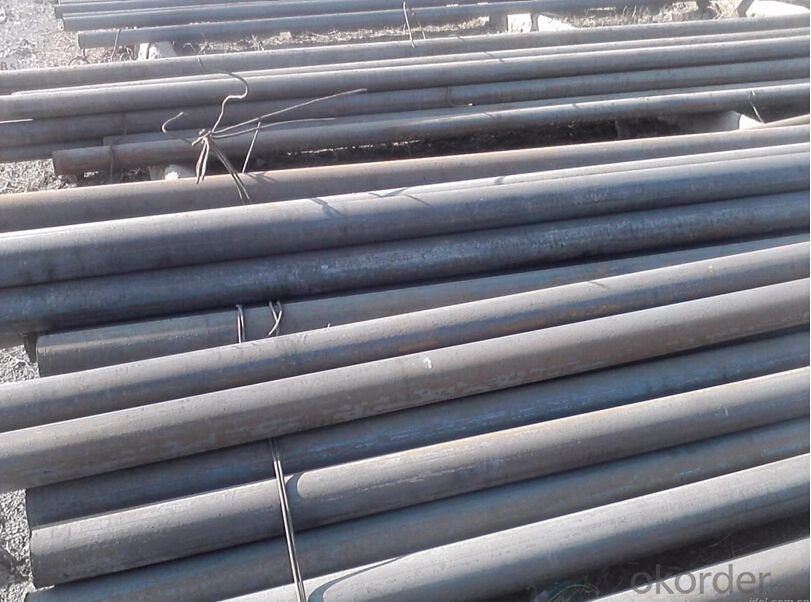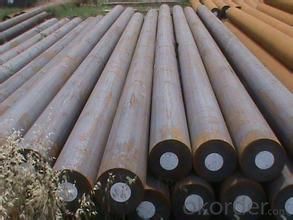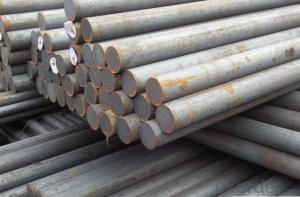Grade ASTM/AISI/SAE 5140 CNBM Alloy Steel Round Bar
- Loading Port:
- Shanghai
- Payment Terms:
- TT OR LC
- Min Order Qty:
- 20 m.t.
- Supply Capability:
- 10000 m.t./month
OKorder Service Pledge
OKorder Financial Service
You Might Also Like
Item specifice
Specifications:
1. Commodity: Round steel bar
2. Technical: Hot rolling
3. Length: Min. 5.8meter, according to requirement.
4.Diameter: 16mm-250mm
Chemical Composition:
Grade | C | Si | Mn | Cr | Ni | Cu | P | S |
40Cr | 0.37-0.44 | 0.17-0.37 | 0.50-0.80 | 0.80-1.10 | ≤0.30 | ≤0030 | ≤0.035 | ≤0.035 |
41Cr4 | 0.38-0.45 | ≤0.40 | 0.60-0.90 | 0.90-1.20 | ≤0.030 | ≤0.030 | ≤0.035 | ≤0.035 |
5140 | 0.38-0.43 | 0.17-0.37 | 0.70-0.90 | 0.70-0.90 | ≤0.030 | ≤0.030 | ≤0.040 | ≤0.035 |
Mechanical Property:
Grade | Tensile Strengthσb (MPa) | Yield Strength | Elongation | Reduction of Area ψ (%) | Impact Akv(J) | Hardness |
σs (MPa) | δ5 (%) | |||||
5140 | ≥980(100) | ≥785(80) | ≥9 | ≥45 | ≥47 | ≤207HB |
Usage and Applications:
Gear, Sleevesspool,Shaft, Crankshaft, Pin
Packaging & Delivery:
Packaging Detail: Standard seaworthy packing or as customer required; all goods are packed in bundle with steel strips and shipped by break bulk vessel or container
Delivery Detail: 15~45 days
Production Flow:
EAF+LF+VD+ Forged+ Heat Treatment
Material prepare (billet) — heat up — rough rolling — precision rolling — cooling — packing — storage and transportation


Quality Assurance:
1. We will strictly inspect our production that we sold according to the customer’s request.
2. Our steel reaches international quality standards.
3. Quality should be in conformity with the specification of the manufacturer. Quantity and packing conditions should be in conformity with the term in the contract.
4. Should the packing found damaged, the buyer has the right to claim to the seller
- Q:What are the different cutting tools used for special steel?
- There are several different cutting tools that are commonly used for special steel applications. These tools are specifically designed to handle the unique properties and characteristics of special steel, which often requires more precise and specialized cutting techniques. Some of the most commonly used cutting tools for special steel include: 1. Carbide tipped saw blades: These saw blades have carbide teeth, which are extremely hard and durable. They can cut through special steel with ease, providing clean and accurate cuts. 2. High-speed steel (HSS) cutting tools: HSS cutting tools are made from a type of tool steel that can withstand high temperatures and maintain their hardness. These tools are commonly used for drilling, milling, and turning operations on special steel. 3. Diamond cutting tools: Diamond is one of the hardest materials known to man, making it ideal for cutting through tough materials like special steel. Diamond cutting tools, such as diamond-coated saw blades or grinding wheels, are commonly used in special steel applications. 4. Waterjet cutting machines: Waterjet cutting machines use a high-pressure stream of water mixed with abrasive particles to cut through special steel. This method is particularly suitable for complex shapes and intricate designs. 5. Plasma cutting machines: Plasma cutting machines use a high-velocity jet of ionized gas to cut through special steel. This method is often used for cutting thick sections of special steel quickly and efficiently. 6. Laser cutting machines: Laser cutting machines use a highly focused laser beam to cut through special steel. This method offers high precision and can be used to cut complex shapes and patterns. It is important to choose the appropriate cutting tool based on the specific requirements of the special steel being worked with, as well as the desired cutting method and application. Consulting with a specialist or referring to the manufacturer's recommendations can help ensure the best cutting tool is selected for the job.
- Q:What are the factors to consider when selecting special steel for a specific application?
- When selecting special steel for a specific application, there are several important factors to consider: 1. Mechanical properties: The mechanical properties of the steel, such as strength, hardness, toughness, and ductility, are crucial in determining its suitability for a particular application. It is important to match the steel's mechanical properties to the specific requirements of the application to ensure optimal performance and safety. 2. Corrosion resistance: Depending on the application, it is essential to consider the steel's resistance to corrosion. Different environments, such as marine, chemical, or high-temperature conditions, may require specific corrosion-resistant alloys or coatings to ensure the longevity and reliability of the steel in service. 3. Temperature resistance: The ability of the steel to withstand high or low temperatures without losing its mechanical properties is crucial in many applications. Factors such as thermal expansion, thermal conductivity, and resistance to thermal fatigue must be considered to ensure the steel can perform effectively in the intended environment. 4. Weldability and fabricability: If the steel needs to be welded or fabricated into complex shapes, the ease of weldability and fabricability becomes an important factor. Some steels may require specialized welding techniques or preheating to avoid cracking or distortion during fabrication. 5. Cost: Cost is also a key consideration when selecting special steel for a specific application. It is important to balance the desired properties of the steel with the available budget to ensure cost-effectiveness without compromising performance or safety. 6. Availability: The availability of the chosen steel grade in the required form, size, and quantity is another critical factor. It is important to ensure that the selected steel can be easily sourced and obtained within the required timeframe to avoid project delays or cost overruns. 7. Compliance with standards and specifications: Depending on the industry or application, there may be specific standards, specifications, or regulations that the steel must comply with. It is essential to select a steel grade that meets these requirements to ensure compliance and maintain the necessary certifications or approvals. By considering these factors, engineers and manufacturers can make an informed decision when selecting special steel for a specific application, ensuring optimal performance, durability, and safety.
- Q:How does hot rolling affect the microstructure of special steel?
- Hot rolling, a metalworking process, involves heating steel above its recrystallization temperature and passing it through rollers to reduce thickness. This process significantly affects the microstructure of special steel. When steel is hot rolled, the high temperature prompts the grains to recrystallize, eliminating defects and creating a more uniform and refined grain structure. This leads to smaller, equiaxed grains, which enhance the steel's mechanical properties. Furthermore, hot rolling encourages the formation of microstructural features like dislocation cells and subgrains. These features increase the steel's strength and toughness, making it suitable for applications requiring high performance and durability. Moreover, hot rolling can cause certain alloying elements to precipitate within the steel. These precipitates play a crucial role in enhancing specific properties such as corrosion resistance or high-temperature strength. Overall, hot rolling profoundly impacts the microstructure of special steel. It refines the grain structure, promotes beneficial microstructural features, and facilitates the precipitation of alloying elements. These changes contribute to improved mechanical properties and performance, making hot rolled steel a preferred choice in industries like automotive, aerospace, and construction.
- Q:What are the different processes involved in making special steel?
- The different processes involved in making special steel include melting the raw materials in a furnace, refining the molten steel to remove impurities, adding alloying elements to achieve desired properties, casting or forming the steel into desired shapes, heat treating to enhance its strength and hardness, and finally finishing processes like machining or polishing to achieve the desired surface finish.
- Q:What are the future trends in special steel manufacturing?
- Advancements in technology, sustainability, and the development of new alloys are expected to shape the future of special steel manufacturing. Technology will play a significant role, with automation and robotics being integrated into the production process. This integration will lead to improved efficiency, precision, and reduced labor costs. Quality control will also be enhanced, allowing for the production of more complex and customized steel products. Sustainability will be a key focus in the industry, driven by the growing environmental consciousness. Companies will seek to reduce their carbon footprint by adopting cleaner production methods, such as utilizing renewable energy sources and implementing recycling programs to minimize waste. Additionally, there will be a shift towards developing greener alloys with reduced environmental impact. The development of new alloys will be crucial in meeting the evolving needs of various industries. Material science advancements will enable special steel manufacturers to create alloys with enhanced properties, including increased strength, durability, corrosion resistance, and heat resistance. These new alloys will cater to the increasing demand for high-performance materials in sectors like aerospace, automotive, energy, and construction. Furthermore, the future of special steel manufacturing will be influenced by the rising demand for lightweight materials. Industries striving for improved fuel efficiency and reduced emissions will require special steel alloys that offer high strength-to-weight ratios. This will drive research and development efforts towards creating lighter yet stronger steel products. In conclusion, the future of special steel manufacturing will be shaped by advancements in technology, sustainability, and the development of new alloys. These trends will drive increased automation, cleaner production methods, and the creation of innovative alloys to meet the changing needs of various sectors.
- Q:What is the role of carbon in special steel?
- Carbon plays a crucial role in special steel as it significantly influences its properties and performance. Special steel refers to a category of steel that is specifically engineered to exhibit exceptional characteristics, such as high strength, hardness, wear resistance, or corrosion resistance. Carbon is one of the main alloying elements in special steel, and its content determines many of these desired properties. Firstly, carbon is responsible for increasing the strength and hardness of special steel. As carbon is added to the iron matrix, it forms iron carbides, which are extremely hard and provide structural integrity to the steel. The higher the carbon content, the greater the hardness and strength of the steel. This makes special steel suitable for applications requiring high toughness, durability, and resistance to deformation, such as in the manufacturing of tools, dies, and industrial machinery components. Secondly, carbon contributes to the wear resistance of special steel. The presence of carbon enhances the steel's ability to resist abrasion and withstand extreme conditions. This is particularly important in industries like mining, construction, and oil and gas, where components are subjected to intense wear and friction. Furthermore, carbon also plays a crucial role in determining the machinability and weldability of special steel. The carbon content affects the steel's response to heat treatment, making it easier or harder to machine or weld. The right balance of carbon content is essential to ensure that special steel can be easily worked on and fabricated into complex shapes without compromising its properties. Lastly, carbon influences the corrosion resistance of special steel. While steel is generally prone to corrosion, the addition of certain amounts of carbon can enhance its resistance to rusting and other forms of corrosion. This is particularly important in applications where the steel is exposed to harsh environments, such as marine or chemical industries. In summary, carbon plays a vital role in special steel by increasing its strength, hardness, wear resistance, machinability, weldability, and corrosion resistance. The precise amount of carbon added to the steel is carefully controlled to achieve the desired properties for specific applications, making special steel a highly versatile and sought-after material in various industries.
- Q:What are the different types of welding techniques used for special steel?
- There are several types of welding techniques used for special steel, including TIG (Tungsten Inert Gas) welding, MIG (Metal Inert Gas) welding, Stick welding, and Flux-cored arc welding. These techniques are commonly used for welding special steel due to their ability to provide strong and precise welds, ensuring the integrity and durability of the material.
- Q:What are the applications of special steel in the marine sector?
- Special steel is extensively used in the marine sector due to its unique properties. It is used in various applications such as shipbuilding, offshore platforms, and marine equipment manufacturing. Special steel provides excellent corrosion resistance, high strength, and durability, making it ideal for marine environments that are highly corrosive and subject to extreme conditions. It is used for constructing hulls, propeller shafts, pipelines, and various components of ships and offshore structures. Additionally, special steel's ability to withstand impact and fatigue makes it suitable for marine applications where safety and reliability are crucial.
- Q:Can special steel be used for making chemical processing equipment?
- Indeed, chemical processing equipment can indeed be manufactured using special steel. It is common practice to opt for special steels, such as stainless steel, for such purposes due to their remarkable ability to resist corrosion, endure high temperatures, and exhibit durability. Given that chemical processing equipment frequently encounters corrosive substances, operates under extreme temperatures and pressures, it becomes imperative to employ materials that can withstand these demanding conditions. Special steel alloys are specifically engineered to possess exceptional resistance to corrosion, including resistance to acids, alkalis, and other aggressive chemicals. Furthermore, these steels are able to maintain their mechanical properties even when subjected to elevated temperatures, thereby ensuring the equipment's integrity and safety. Consequently, special steel emerges as an appropriate choice for the production of chemical processing equipment.
- Q:Can special steel be used in the rubber manufacturing industry?
- Yes, special steel can be used in the rubber manufacturing industry. Special steel is often used to create molds, tools, and equipment that are used in the production of rubber products. It is valued for its strength, durability, and resistance to wear and tear, making it suitable for various applications in the rubber manufacturing process.
1. Manufacturer Overview |
|
|---|---|
| Location | |
| Year Established | |
| Annual Output Value | |
| Main Markets | |
| Company Certifications | |
2. Manufacturer Certificates |
|
|---|---|
| a) Certification Name | |
| Range | |
| Reference | |
| Validity Period | |
3. Manufacturer Capability |
|
|---|---|
| a)Trade Capacity | |
| Nearest Port | |
| Export Percentage | |
| No.of Employees in Trade Department | |
| Language Spoken: | |
| b)Factory Information | |
| Factory Size: | |
| No. of Production Lines | |
| Contract Manufacturing | |
| Product Price Range | |
Send your message to us
Grade ASTM/AISI/SAE 5140 CNBM Alloy Steel Round Bar
- Loading Port:
- Shanghai
- Payment Terms:
- TT OR LC
- Min Order Qty:
- 20 m.t.
- Supply Capability:
- 10000 m.t./month
OKorder Service Pledge
OKorder Financial Service
Similar products
New products
Hot products
Related keywords





























